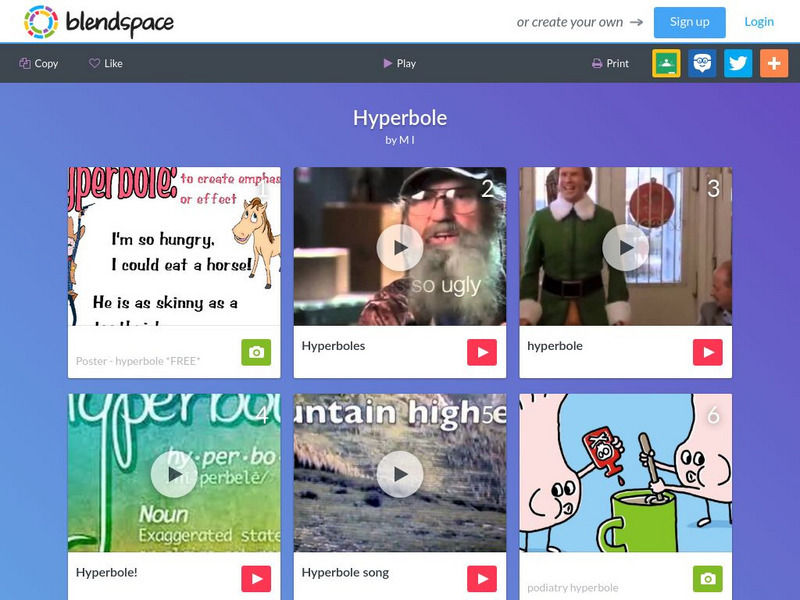Mary Pope Osborne, Classroom Adventures Program
Mummies in the Morning Egyptian pyramids, hieroglyphics
Visit the Magic Treehouse and take your class on a trip through time with a reading of the children's book Mummies in the Morning. Using the story to spark an investigation into Egyptian culture, this literature unit engages...
EngageNY
A Rainforest Folktale: Determining the Message of “The Wings of the Butterfly,” a Tukuna People Tale
Did you the message? Scholars listen to a read aloud of The Wings of the Butterfly to summarize and determine the message of the text. They discuss the folktale and vocabulary in groups, then use a double bubble map to compare the story...
K5 Learning
Little Red Riding Hood
Little Red Riding Hood brings lovely treats to her grandmother, and valuable reading skills to your pupils. After reading the short fairy tale, fifth graders answer four comprehension questions.
Curated OER
Maniac Magee: Magic Number Strategy
Take a break from reading to find the magic number with this vocabulary game using words drawn from Jerry Spinelli's Maniac Magee. Participants match the definition to the word in each numbered square of the puzzle, then add...
Novelinks
Maniac Magee: Discussion Questions
Why did they say that? What did they mean? How did they feel? Using the six levels of Bloom's Taxonomy, challenge your young readers to answer the comprehension questions about chapters 41 and 42 of Maniac Magee by Jerry Spinelli. Each...
Curated OER
Maniac Magee: Found Poem
Instruct your readers to scrounge through the pages of Maniac Magee in search for descriptive passages or words they may use to write poetry. As they look for meaningful, sensory descriptors in Jerry Spinelli's novel, readers...
McGraw Hill
Study Guide for Hatchet
Use this packet as a companion to your study of Hatchet by Gary Paulsen. The resource breaks the novel up into several chunks, and for each chunk provides activities, background information, vocabulary, graphic organizers, and response...
Curated OER
Genre Lesson: Poetry
Here is a terrific lesson on poetry! Learners bring in the lyrics to their favorite song. A class discussion ensues regarding what makes a song "catchy." After analyzing the alliteration of the poems, learners read the poem "This...
Curated OER
Genre Lesson: Poetry
Hook kids into a study on poetry elements by asking them to bring in the lyrics to their favorite song. Discuss the elements in one or two songs (preferably that demonstrate rhyme, figurative language, or a repeating phrase). Groups do...
Curated OER
Comparing Two Stories
Compare new and old versions of the classic story Alice in Wonderland in this comprehensive instructional activity packet. Learners read an excerpt from the original, answering several analysis questions. They do the same for a...
Curated OER
My Senator and Me: A Dog's-Eye View of Washington, D.C.
Although this legislative process lesson is designed to accompany a specific text, it is valuable independently. Young learners participate in a picture walk (worksheet included) through My Senator and Me: A Dog's-Eye View...
PBS
Pbs Learning Media: Elements of Poetry
Discover how literary techniques like figurative language, imagery, and symbolism contribute to the overall meaning of a poem. Explore how a poet establishes and builds on a theme and the difference between tone and mood. Through a close...
PBS
Pbs Learning Media: Literary Elements and Techniques: Figurative Language
Discover how authors use figurative language to enhance their writing and explore the differences between similes and metaphors in this animated video [3:37] from WNET. Discussion questions below help students to further apply their...
TES Global
Blendspace: Hyperbole
Work through fifteen links to images, videos, and activities to learn about hyperbole.
TES Global
Blendspace: La Figurative Language Hyperbole
Work through six links to images, videos, and activities to learn about hyperbole.
Other
My Schoolhouse: Simile, Metaphor, Hyperbole
Definitions and examples of simile, metaphor, and hyperbole followed by 15 sentences asking students to identify whether the sentence contains a simile, metaphor, or hyperbole.
















